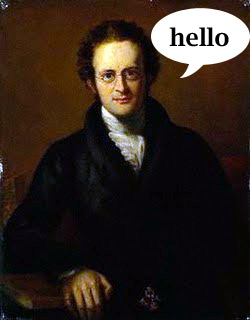Nowadays, Brits are notoriously monolingual. Some people attribute this to the wide use of the English language around the world. Others say that the education system in Britain doesn’t place any value on foreign language learning.
In contrast to the current malaise, a couple of centuries ago Brits were keen language learners. And one stands out above all others.
Sir John Bowring (October 17, 1792-November 23, 1872) was a member of the British Parliament, political economist, businessman (who spent much of his life on the verge of bankruptcy), reformer, writer, editor and linguist. His most famous – some might say controversial – role was as governor of Hong Kong.
He had been sent to Hong Kong to be far away from London as possible so he could cause minimal fuss. Instead, he managed to start the second Opium war between Britain and China and almost brought down the government.
Languages
One of Bowring’s great loves was language learning. He boasted that he could speak one hundred languages and could read a further hundred, but this was hard to prove. It seems a little unlikely, especially as the man was known for self aggrandising (he named a district “Bowrington” after himself) and telling the occasional fib.
In 1862, for example, writer Harriet Martineau described him as ‘a supreme charlatan and worse: a cheat, a liar, and, at least once, a swindler.’ But we won’t let that get in the way of a good story. Bowring certainly wouldn’t.
There is no doubt that Bowring had a skill for languages. Some people estimate that, upon his death, he could speak eight languages fluently, read and write another seven and could understand a further twenty five. The poet Thomas Hood wrote of Bowring:
Try him in these, and fifty more,
His skill will not diminish,
Although you should begin in Dutch,
And end, like me, in Finnish.
Life
 John Bowring was born into a puritan family and initially considered becoming a minister in the Church. Life took him in another direction and, after finishing school in Exeter he found work in a merchant’s house.
John Bowring was born into a puritan family and initially considered becoming a minister in the Church. Life took him in another direction and, after finishing school in Exeter he found work in a merchant’s house.
It was there that the young Bowring started developing his language skills, through speaking on a daily basis with visitors from around the world. According to a biography written by his son, Bowring learned French from a refugee priest, Italian from barometer salesmen and Spanish, Portuguese, German and Dutch through dealing with his business contacts.
He always pursued his passion for writing alongside his own business career, which soon took him around the world. He took every opportunity to practise his language skills and wrote regularly in foreign languages.
During his life, Bowring translated to and from a range of languages, including a volume of Czech medieval poetry and noted translations of Goethe, Schiller, and Heine. He also wrote studies of Russian, Czech, Swedish, Magyar, Serbian and Spanish poetry among others.
He found himself attracted to politics and, after a period of representing the government on commercial missions around Europe and Asia, he was elected to the Houses of Parliament as MP for Kilmarnock in Scotland. As an MP, he was very progressive and started the process of decimalising British money. It was over a hundred years before it was finally completed!
Asia
When his mining business collapsed in the 1840s, Bowring was sent to be the fourth British Governor of Hong Kong to avoid scandal at home. Despite his love of languages and exploring cultures, he was a bona fide imperialist and started offending Asian sensibilities soon after arriving!
He has the dubious honour of being one of the fathers of gunboat diplomacy, after telling the King of Siam before a visit to “discuss” free trade, ‘I have a large fleet at my disposal but I would rather visit you as a friend than as bearer of a menacing message,’ and starting a war with China over a trivial matter.
Unsurprisingly, this made him unpopular with the locals. This resentment had tragic consequences when an attempt by the Chinese to poison him with arsenic-laden bread killed his wife slowly and painfully.
But, for all his insensitivity, Bowring was also captivated by the local languages and wrote a number of highly respected books about Asian cultures.
After nine years in Hong Kong, he spent a short time as an MP and trade representative in Italy before his death in 1872.
What can we learn from John Bowring?
John Bowring used his language skills very successfully throughout his career. His reputation as a great linguist helped him to attain powerful positions which, in turn, allowed him to learn more languages and explore more cultures. Employers have always valued language skills.
He used poetry and literature – two things that he was deeply passionate about – as a “way in” to languages and cultures. Nowadays, music and cinema can play the same role. Find something that interests you and use it as a tool in your learning.
And finally, never undervalue cultural sensitivity. Do you want to become an Hyperglot? Visit ESL and discover all the languages you can learn!



What do you think?